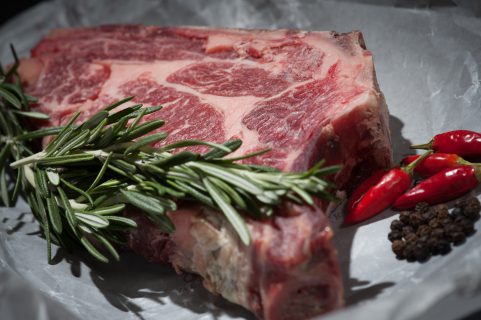 At 50 years old, I’m the heaviest I’ve ever been. That’s actually a good thing. Most guys my age are trying to trim down, lose the “spare tire”, beer gut, whatever you want to call it. I’m on a quest to gain weight, particularly muscle.
At 50 years old, I’m the heaviest I’ve ever been. That’s actually a good thing. Most guys my age are trying to trim down, lose the “spare tire”, beer gut, whatever you want to call it. I’m on a quest to gain weight, particularly muscle.
When I was 46, I took up the sport of rugby. I know that sounds crazy, but that’s a story for another time. I had been back in the gym for about a year, and weighed close to 170 lbs. I thought I was fit, but after a couple of weeks of running my guts out in 90 degree weather, I dropped down to 160. That first season I got the crap kicked out of me. Not only was I the oldest guy on the team (by far), I was also the smallest. I needed more muscle to cushion the blows I was taking on the field.
Muscle Building at 50
The problem is that somewhere in your 30’s, your body quits building muscle and actually starts losing it. It’s a natural part of aging called sarcopenia. Of course, with that loss of muscle mass, you also lose strength. I have too many things that require a fair amount of strength; I still play rugby, I work on cars, and because I also have 5 other guys living with me, we get constant calls to help move or lift whatever needs to be moved or lifted.
And hey: I still want to look good naked. And clothed, I guess.
Protein Supplementation
If losing muscle is a fact of life, can we slow the process down? I’m on a quest to do just that, and at this point I’d say “yes”. It wasn’t until I discovered that there’s a magic protein formula that I started gaining weight and packing the muscle back on. Now I’m up from 160 lbs to 175 lbs.
There’s a lot of discussion about this on the interwebs, but the “magic formula” seems to be about 1 gram of protein per pound of body weight in order to gain muscle weight. So at my current weight, I should aim for about 175 grams of protein a day.
To give you an idea of what you’d have to eat to get that much protein, check out these numbers:
- 1 lb chicken breast = 16 g
- 1 lb ribeye steak = 108 g
- Hard boiled egg = 6 g
- 1/2 cup Greek yogurt = 8 g
Depending on what’s available in a given day, 175 g of protein would be hard to do. I certainly can’t afford steak every day. So I supplement with 2 protein shakes per day. Each shake contains about 27 g of protein. Along with my regular meals, this puts me in the ball park of my target.
Types of Protein Supplements
There are lots of options when it comes to protein supplements, but the big 3 are whey protein, casein protein, and some kind of vegetable protein. Let me say that as a high school kid I took protein shakes and they were awful. They never mixed well and they tasted terrible. My experience these days is that the whey and casein shakes generally taste pretty good and mix well. Not so with the vegetable protein powders. The ones I’ve tried are pretty terrible, so I’m not even going to mention them in this article.
So what’s the difference between whey and casein, and which one should you choose? It mainly boils down to how quickly the body metabolizes or synthesizes the protein. Whey protein causes your muscle protein synthesis to spike pretty high, but it’s short lived. Casein, on the other hand, takes much longer to work it’s way through your system, so your body is in synthesis mode for a longer period of time, giving you a bigger boost. Casein also has more amino acids that your body needs, especially if you’re really active.
Both casein and whey are derived from milk products, but extracted differently. Whey comes from the liquid portion of milk (mostly it’s a byproduct of yogurt production) whereas casein comes from milk solids. A whey supplement is usually cheaper than casein (because, again, it’s a byproduct of another process) so when pricing protein the cheaper option is probably a whey supplement. But high-quality protein powders will have some combination of the two. Also, you can be picky and buy an all-whey or all-casein supplement.
My Protein Supplement Strategy
Based on my budget, my goals and the application of some recent studies and articles I’ve read, here is how I approach my protein supplementation:
- One whey protein shake in the morning about 9 am (or 12-14 hours after my last food intake the day before). This is my all-around breakfast shake, so it has more than just protein powder: it has milk, spinach, yogurt, berries, and banana as well.
- On workout days, I drink another whey protein shake right after workouts. The quick spike in protein synthesis seems to be helpful after my body has shifted into high gear after a heavy workout.
- On non-workout days I have a simple whey protein shake about an hour to hour and 1/2 before bed time (which is 10 or 11 pm).
- Every night I try to eat 150 g serving of Greek yogurt about an hour before bed. Greek yogurt, cottage cheese and other cheeses are good sources of casein protein. Rather than purchase another protein supplement, I get a shot of yogurt to give me that slow-release protein overnight.
Conclusion
This strategy has worked for me. 15 pounds over the course of last year, while dropping a waist size from 32 to 30. For now, 175 lbs seems to be my magic weight; I haven’t gained any additional weight in the last 3-6 months. But I’m at least holding steady, and my strength numbers are increasing in the gym.

If you want some more geeky reading, here are a couple of articles that make sense of muscle protein synthesis, protein timing, etc.
- Whey Protein vs Casein Protein and Optimal Recovery, National Strength and Conditioning Association
- Perfecting Protein Intake in Athletes: How Much, What, and When? (and Beyond), Stronger By Science
- Nutrition and muscle protein synthesis: a descriptive review, Journal of the Canadian Chiropractic Association